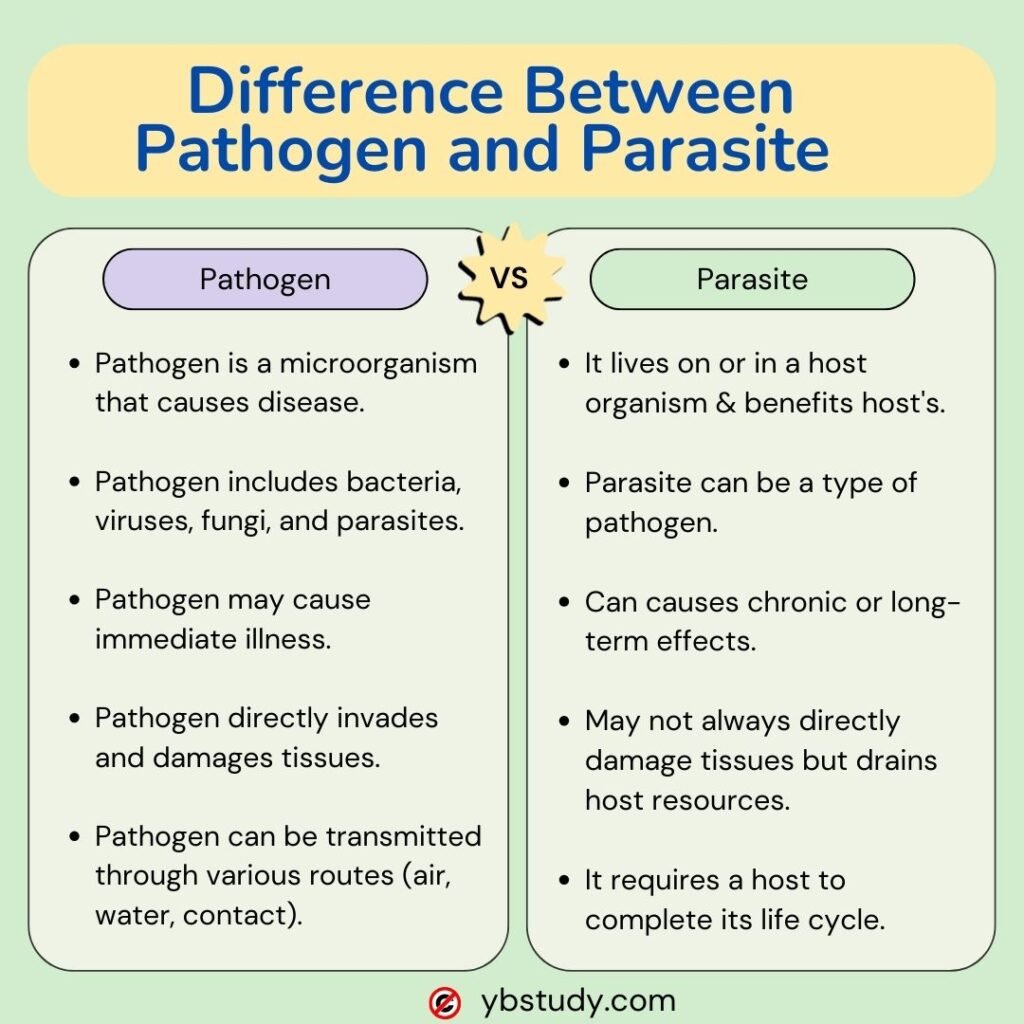In this article, we are going to discuss what a is pathogen, what a is parasite, and the Difference Between a pathogen and a Parasite. Generally, pathogens and parasites are kinds of microorganisms that can harm the host organisms, but there are some important difference between pathogens and parasite. Pathogens are the kind of microorganisms that cause diseases, such as bacteria, viruses, fungi, and protozoa. These spread fungal infections in the host's body and weaken the host's immune system.
On the other hand, parasites are organisms that depend on the host organism for their life cycle, such as insects and lice. They take nutrition and protection from their host organisms, and sometimes they even destroy or kill the host's organisms. Both pathogens and parasites can be harmful to the host, but parasites have a more complex life cycle and can remain associated with the host for a longer period.
What is the Difference Between Pathogen and Parasite?
| Pathogen | Parasite |
|---|---|
| A pathogen is an organism or agent that causes disease in its host. | A parasite is an organism that lives on or in a host organism and depends on it for survival, often causing harm or disease. |
| Pathogens include viruses, bacteria, fungi, and other infectious agents. | Parasites can be protozoa, helminths (worms), or arthropods like ticks and lice. |
| Pathogens typically do not require a host to complete its life cycle. | Parasites will have to depend on their host to complete their life cycle. |
| They spread through various means such as air, water, or direct contact with infected individuals. | Parasites typically live within or on the host, acquiring nutrients at the host's expense. |
| Examples include the influenza virus, Salmonella bacteria, and malaria parasites. | Examples include malaria parasites, tapeworms, and fleas. |
| Pathogens cause diseases like the flu, gastroenteritis, and pneumonia. | Parasites cause conditions such as malaria, intestinal worms, and scabies. |
5 Key Difference Between Pathogen and Parasite PDF Image
- A parasite is an organism that lives on or in another organism at the expense of the host's body, while a pathogen is a disease-causing agent.
- Most parasites are prokaryotic organisms, except fungi, while all pathogens are eukaryotic organisms.
- Not all parasites are disease-causing agents, while all pathogens cause disease in hosts.
- Parasites cause diseases like amoebic dysentery and malaria, while pathogens cause diseases like food poisoning, flu, AIDS, etc.
- Some plants are also parasites, but pathogens are always microorganisms.

Similarities between Pathogen and Parasite
| Aspect | Similarity |
|---|---|
| Harm to Host | Both pathogens and parasites cause harm to their host organisms. |
| Survival Strategy | Both rely on the host for survival, reproduction, or nourishment. |
| Immune Response | Both trigger immune responses in the host body. |
| Transmission | Both pathogens and parasites can be transmitted from one host to another. |
| Infectious Nature | Both are infectious agents that can invade and multiply inside a host. |
| Health Impact | Both can lead to diseases or health complications in the infected host. |
| Types and Diversity | Both include a wide variety of organisms such as bacteria, protozoa, fungi, and worms. |
| Medical Importance | Both are important in medical science due to their role in causing infectious diseases. |